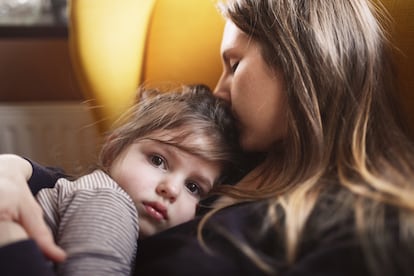Why helicopter parenting creates fearful children who cannot solve their own problems
Being on top of your child constantly, anticipating their every need, prevents them from learning how to handle frustration or cope with setbacks

The journalist Eva Millet explains in her book Hiperpaternidad (or Hyperpaternity) that her grandmother used to recommend acting towards children “as if they were furniture.” That is, to ignore them until the tantrum passed or they stopped being a nuisance. Now, Millet feels that this type of “furniture parenting” is being replaced by hyperparenting, “which involves being on top of the child constantly, fulfilling and anticipating their every wish, structuring their day, including leisure time, and solving every problem that arises.” In thousands of homes, children have become the center of attention, as if they were a star that everyone else revolved around.
The concept of helicopter parent was coined to describe mothers and fathers who hover over their children at all times. As the journalist notes, the first written record appeared in the book Between Parent and Teenager, published in 1969 by the psychologist and child educator Haim G. Ginott, who quoted a teen patient as saying: ”Mother hovers over me like a helicopter.” It is not very difficult to detect them: they are the very dedicated and hyper-suffering fathers and mothers whose role it is to prevent their children from having even the tiniest accident or suffering the smallest scratch. What used to be normal and natural, like climbing trees, is now a string of: “You’d better not,” “Get down from there,” “It’s dangerous.”
Millet’s book includes a quote by the psychologist Maribel Martínez: “This type of upbringing, based on always protecting the children and solving their problems for them, renders them useless both emotionally and for pragmatic things.” The message they may be getting is “you can’t do it by yourself.”
“Having someone who doesn’t allow you to make mistakes prevents you from learning from your mistakes, which is key to personal development,” notes Martínez.
It may seem that their lives are being made easier, that they are being pampered in a healthy way, but they are in fact being deprived of the acquisition of personal autonomy. The teacher and child educator Estefanía del Pozo Asensio believes that too much pressure or care can only bring negative consequences: “We have to educate children to be self-reliant, to be able to solve their own problems, to have their own personal time and space to reason and develop their imagination and creativity.”
Hypervigilant parents also disrupt children’s ability to trust in themselves to achieve goals. “If they see themselves capable of solving different situations, of finding solutions to a problem, it has a direct impact on their self-esteem.”
Overprotection is also directly linked to fear and dread. It prevents children from learning how to handle frustration and cope with setbacks. For the psychologist Marta Segrelles, “teenagers and adults can feel tremendously overwhelmed in everyday situations such as making decisions, a change of plans or an unforeseen event in a social context.”
“This style of upbringing based on fear can affect children, leading to worried, demanding or avoidant behaviors in new situations,” says Segrelles.
Children need security, not control in their relationships. “Having been raised overprotected means that as adults they may wear “glasses” that make them see threats everywhere,” says Segrelles. Hyperparenting makes it difficult for children to trust their own abilities to deal with situations and emotions. “When they grow up they tend to feel like a burden and don’t want to bother anyone, so they are comfortable obeying and being at the service of others.”
Tu suscripción se está usando en otro dispositivo
¿Quieres añadir otro usuario a tu suscripción?
Si continúas leyendo en este dispositivo, no se podrá leer en el otro.
FlechaTu suscripción se está usando en otro dispositivo y solo puedes acceder a EL PAÍS desde un dispositivo a la vez.
Si quieres compartir tu cuenta, cambia tu suscripción a la modalidad Premium, así podrás añadir otro usuario. Cada uno accederá con su propia cuenta de email, lo que os permitirá personalizar vuestra experiencia en EL PAÍS.
¿Tienes una suscripción de empresa? Accede aquí para contratar más cuentas.
En el caso de no saber quién está usando tu cuenta, te recomendamos cambiar tu contraseña aquí.
Si decides continuar compartiendo tu cuenta, este mensaje se mostrará en tu dispositivo y en el de la otra persona que está usando tu cuenta de forma indefinida, afectando a tu experiencia de lectura. Puedes consultar aquí los términos y condiciones de la suscripción digital.








































